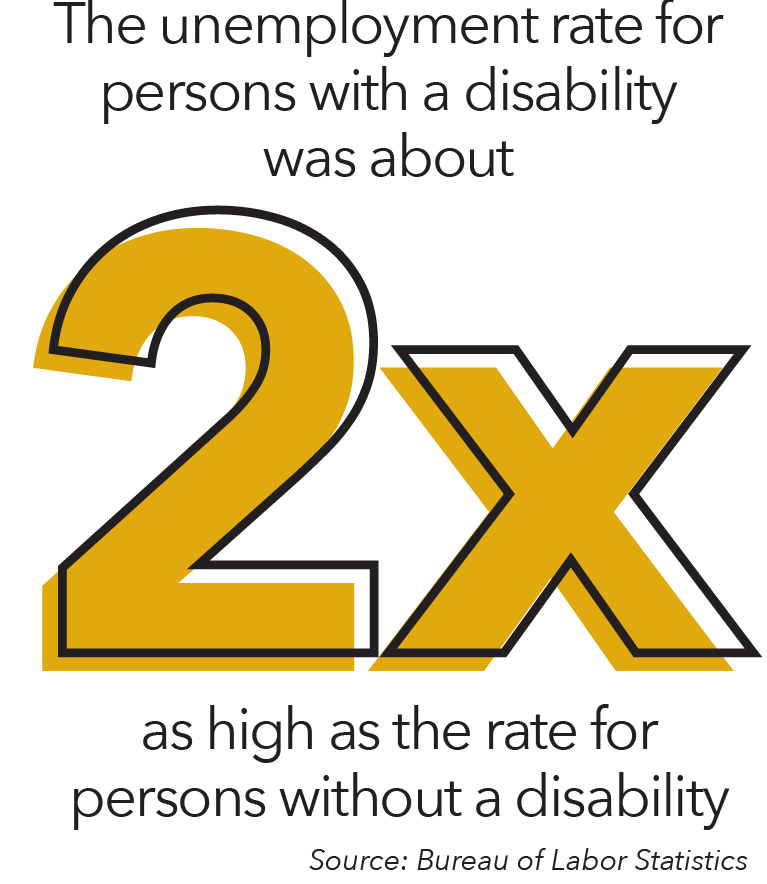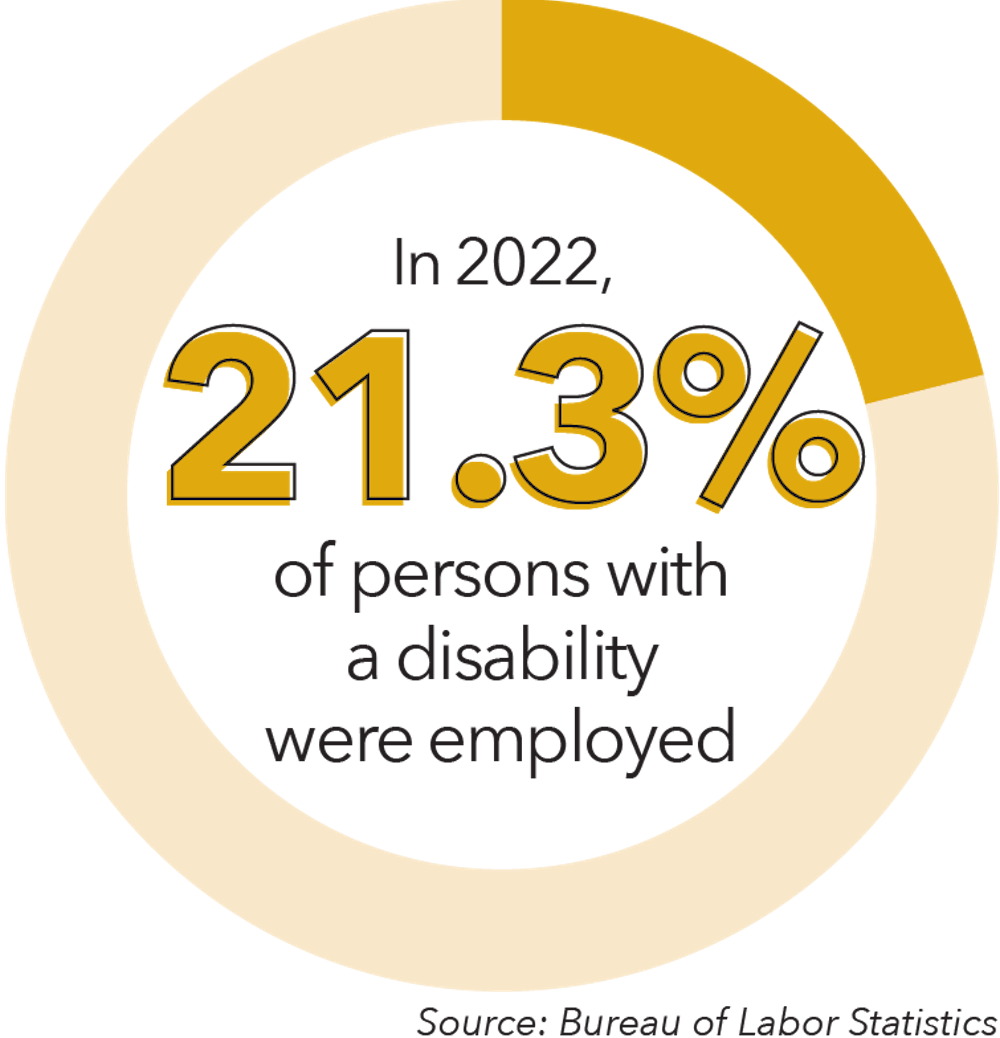Editor's Note: Born two months premature, Katherine Hill was diagnosed with Congenital Diplegia Cerebral Palsy by age two and developed a stutter which has followed her from elementary school in varying degrees of severity. Now an adult and in the workforce, she’s been on the front end of some linguistic microaggressions that are worth correcting.
Disclaimer: This list does not represent every disabled person’s opinions, thoughts or feelings, nor is it limited to only five phrases.
October is National Disability Employment Awareness Month, and despite the month coming to a close, here are some good reminders for what to, and not to, say to a disabled person—whether cognitive or physical—and tips for what to say instead:
“What’s wrong with you?”
No. Just no. This is the rudest possible way to go about asking someone about their situation if you wish to receive a genuine answer. Most disabled people welcome questions— but only if asked respectfully. Following up this question with “No offense,” or “I wasn’t trying to be rude,” does not make it any less offensive, rude or blatantly ignorant.
More respectful ways to ask the same question include:
- “May I ask about….”
- “I noticed this. I am interested in learning more. Could you tell me about it?”
- “Do you feel comfortable talking about…”
Refrain from using the term “special needs.”
“Special needs” is a generic and outdated umbrella term for a set of unique circumstances. The euphemism first came about in the 1960s because, “The thinking was that parents might feel more comfortable saying, ‘My child has special needs,’ rather than, ‘My child is disabled,’’’ wrote Autism Consultant Lisa Jo Rudy for Very Well Family.
It’s not politically incorrect, but when one uses this term, especially when referencing an individual, it can give the impression they do not care enough to learn about that individual’s disability. For some people, their disabilities are their identities.
Disabilities, conditions and diagnoses have names, and any sugar-coated term such as “special,” “differently-abled” or “handicapable,” belittles the authentic experience of what it is to be disabled. The best way to show that you care about a mentally/physically disabled person is to educate yourself about their specific needs. In reference to multiple disabled people, the term “disabled” is adequate.

“You’re such an inspiration!”
This is often said by someone who genuinely means well, which most people in the disabled community know and can appreciate— but most disabled people don’t live to be someone else’s inspiration. They are human— just like the rest of the public— and for those who hold praise in high regard, being called “an inspiration” can do more harm than good.
It can create an irrational fear of disappointing someone by way of inevitable human error. When trying to give positive reinforcement to a disabled person, one should always be mindful of their tone and the present moment or situation they are in. Most related comments from strangers such as, “You’re doing an excellent job,” or “I’m proud of you,” although meant kindly, are not essential, as they are often said after a disabled person has completed menial, basic taskwork— and can come off as condescending.
“Relax.”
It’s never a good idea to tell anyone this upon first meeting them because one has no idea of the past experiences that have shaped the person who may appear uneasy. Disabled people can often be divided into two categories: those who speak up for themselves and their needs almost imperatively, and those who have trouble doing so out of nerves or judgment.
Both types of people don’t need to “relax.” They need someone to listen closely—oftentimes because the last person didn’t.
Disability is a complicated existence. Open ears and deliberate eye contact make a world of difference to help those affected feel heard and seen.

“You can’t/shouldn’t do that.”
This is a common phrase that parents tell their children from time to time— with good reason. The intent, of course, is to keep them safe, but at some point, parents develop trust in their child’s judgment, per the natural order of growth and development.
However, for disabled people, decades of demographic-related stigma make it extensively harder to gain that trust, from both loved ones and generalized society. Disabled people are people, people who know they have limits. When one draws attention to those limits, it can be deeply hurtful and prompt the disabled person to be driven by nothing but debunking that underestimation.
This is dangerous— and can lead to a poor self-image over time if trust is not instilled in relationships.
If presented with a situation where the safety of a disabled person becomes a concern, do not immediately take control by offering to do something for them. Do not assume they need help either. The offer will more than likely be declined because such abrupt assumptions can be insulting.
Instead, try asking, “What can I do to help?” or, “I want to help. I would appreciate it if you would let me.” Those phrases put the disabled person back in control of the situation. Always look for adaptations before resorting to negative and definite terminology such as, “no,” “never” or “can’t.” The task needs to be adapted to fit the person, never vice versa.
Ball State University is one of the leading accessibility institutions in Indiana. Earlier this year, it was ranked in the top 10 of “wheelchair-friendly colleges” in the Wheels on Campus edition of New Mobility magazine.
Campus resources include the Alliance for Disability Awareness Club, a student organization that meets monthly and is dedicated to disability education and awareness, and the Office of Disability Services. To learn more about physical and cognitive disabilities, or to receive accommodations, stop by their office in the student center, call (765)-285-5293 or email dsd@bsu.edu.
Contact Katherine Hill with comments at katherine.hill@bsu.edu.





